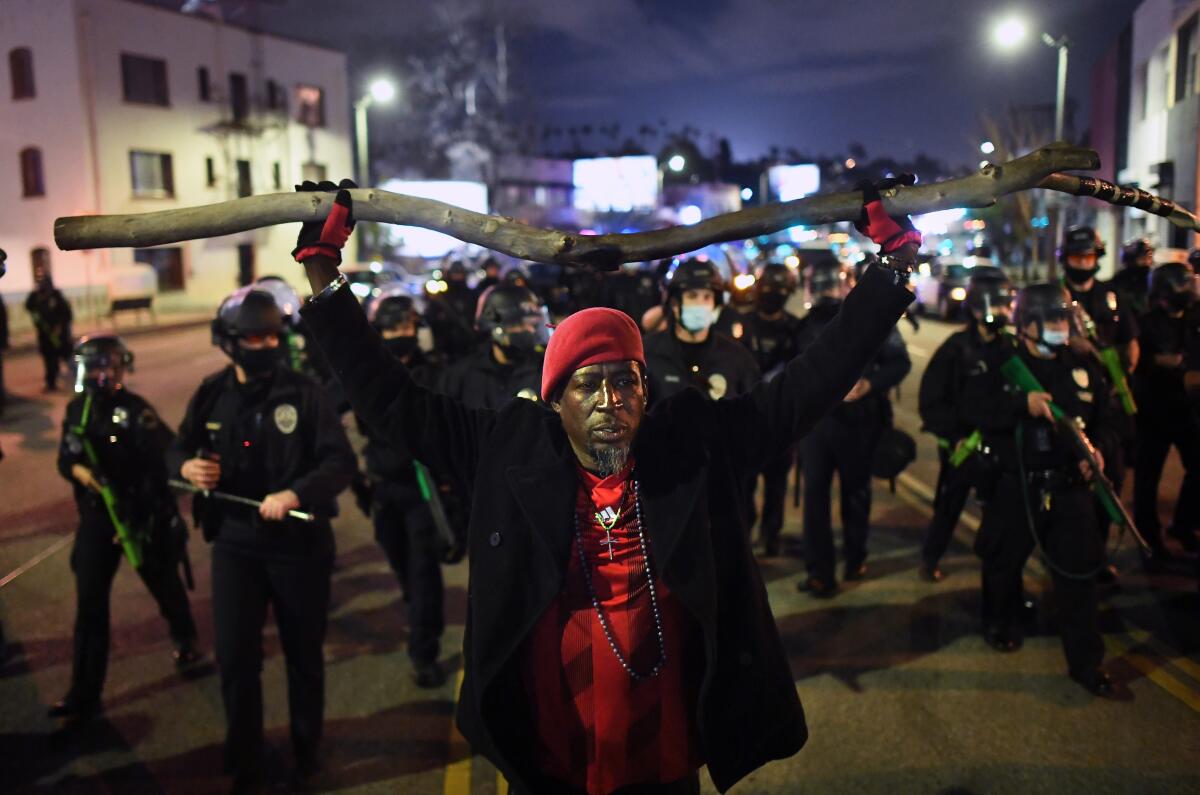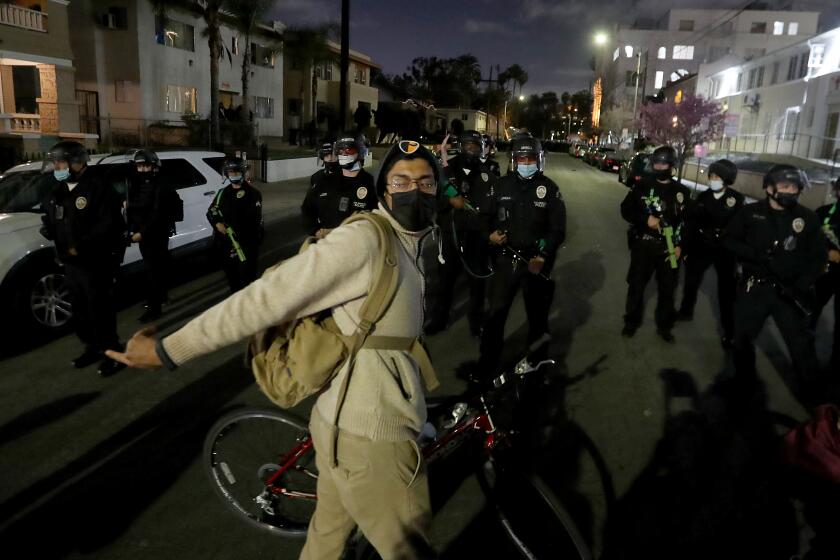LAPD violence in Echo Park enforced class divisions, not public safety

- Share via
On a skirmish line a mile from my home, I stood with hundreds of Echo Park residents against the Los Angeles Police Department. It was March 24, and the police had just initiated a violent raid of Echo Park Lake, a home to unhoused Angelenos where mutual aid and compassion thrived. Police choppers roared overhead, a seemingly inescapable power looming from on high.
That night, as so many nights before, the LAPD’s mandate was to smash the community living in the park and further displace the displaced. Ours was to stand with our unhoused neighbors against the eviction, and to ensure that the public space of Echo Park Lake was kept public.
Only one side was willing to wage violence upon the other. The cops were riot-ready and toted “less lethal” weaponry. On the front line, a cop took his baton to me with the explosive force of a baseball swing, and he broke my arm. A “classic case of nightstick fracture,” the emergency room doctor told me. There is nothing unique about what was done to me that night.
Like hundreds of protesters last week, I stood against the LAPD because they serve not public well-being but the unjust order of things, a racist status quo of immense economic inequality, backed by police violence. As the writer Wes Enzinna describes in Harper’s Magazine, unhoused people are “capitalism’s refugees.” They are persona non grata. They are regularly subjected to punitive violence, typically with impunity. In Los Angeles, one in three instances of police force are directed against unhoused people. In practice if not in law, the police have a right to maim.
Last week, the LAPD deployed this right to maim just as it did during the 2020 uprising for Black lives. Minutes after a cop beat me, his colleagues pushed a man to the ground and shot him with a “less lethal” projectile weapon at point-blank range. In close quarters, such gunfire is potentially lethal, in fact. The next night, the LAPD detained 182 people, including demonstrators, reporters and legal observers. A mob of police pushed a woman to the ground so violently that she suffered a concussion. “I was a bystander,” she said. “I was really just standing there watching.”
The police in leading a crackdown on a peaceful community acted in violation of COVID-19 guidelines from the Centers for Disease Control and Prevention. But elected officials called the police operation a great success. “Our approach has been compassionate, thoughtful and mission-driven,” said Mitch O’Farrell, the council member who represents Echo Park. He then blamed the people detained by the police, including legal observers and journalists, for being arrested.
Echo Park protesters and others allege police used excessive force, raising new questions about crowd control tactics.
In his public comments, O’Farrell also downplayed his own long-standing opposition to the visible presence of poverty, an opposition that has full support from the LAPD and residents in the neighborhood who have resources and homes. In ceaselessly gentrifying Echo Park, as elsewhere, the police function as enforcers of class divisions, without regard for the lives and rights of the unhoused.
Like other pro-business liberals in Los Angeles, O’Farrell is primarily concerned with the seeming ugliness of poverty; he regularly speaks of the need to “beautify” public space. The implication here is that unhoused Angelenos should be hidden from sight. O’Farrell’s plan to help residents of Echo Park Lake is what he calls “transitional housing,” like the state program Project Roomkey. It’s “a carceral solution” to homelessness, one of my unhoused neighbors told me last week. The doors are locked from 7 p.m. to 7 a.m.
The program offers a small number of housing units through September, granting temporary respite to a sliver of the unhoused community. It also provides cover for O’Farrell and the LAPD to permanently cleanse the park so that it is no longer accessible to the poor, a complete perversion of the idea of a public space.
This is gentrification in action. When those with power and wealth cannot achieve their aims through public acquiescence, police violence becomes useful. The principal public space in Echo Park has now been enclosed in chain-link fencing. It will open up again, but not for everyone. Under constant threat of police invasion, Echo Park Lake will be maintained for the few, not the many.
Isaac Scher is a writer and researcher living in Los Angeles.
More to Read
A cure for the common opinion
Get thought-provoking perspectives with our weekly newsletter.
You may occasionally receive promotional content from the Los Angeles Times.










